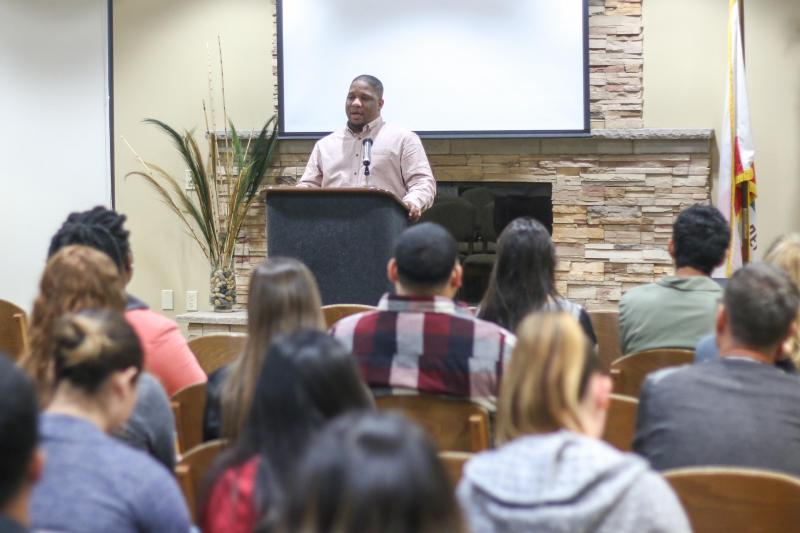
Provost Kimberley Greer opened the conference, linking its theme to University values of establishing environments supportive for all, eliminating inequality and promoting inclusiveness. Ten evening speakers covered social justice movements, fields of study focused on underrepresented groups, personal journeys and a range of perspectives on immigration.
In the afternoons, 14 sessions of panels, performances and interactive discussions brought students into contact with experts and local activists addressing high-interest topics like DACA, community equity cases and white supremacy.
This third conference was dedicated to the Central Valley, exploring global problems faced by communities in the Stan State region. “It’s a different context to be thinking about human rights and immigrant rights here. The theme is about attention to our own country, and I think the speakers are bringing that home,” said organizer James Tuedio, dean of the College of Arts, Humanities and Social Sciences.
Alejandra Rincón, assistant vice-chancellor for diversity and outreach at the University of California, San Francisco, stressed the urgency of framing the debate around undocumented immigrants in terms of human rights. Lawsuits seeking restoration of the Deferred Action for Childhood Arrivals (DACA) focus on the voluntary provision of personal information in exchange for protection, Rincón said. “For the most part, they all argue the same thing, that (the President’s recent order rescinding DACA protections) was a violation of the equal protection clause of the Constitution; but primarily it was a cruel bait and switch.”
One session addressed the need for legal help in civil cases for indigent litigants, highlighting the urgency of responding to proposed cuts in federal funding support for legal aid organizations. Speaking from his experience as a California administrative law judge, John DeCure called the issue a justice gap, citing statistics showing a pervasive need for legal advice on critical matters such as expunging prior convictions, addressing substandard rental conditions or filing for child custody.
Stanislaus State instructor Andrew Conteh spoke about the aspirational work of the United Nations, where he served as delegate to the General Assembly in 1981-82 for his native Sierra Leone. His years as a diplomat included stints as Sierra Leone ambassador to the USSR and deputy high commissioner to the United Kingdom. After 30 years teaching political science at Minnesota State University, Moorhead, he now leads Stan State classes on foreign policy and the U.N. model of international relations.
“For the United Nations, the maintenance of international peace and security are closely tied to the protection of human rights,” Conteh said. “The maintenance of international justice is closely tied to social justice as well. In other words, ladies and gentlemen, security is not simply about procurement of arms. It is not only the state that should be secure. Human beings have to be secure, and where human beings are not secure, that surely is a recipe for disaster. That surely is a recipe for conflict.”
Conteh pointed to a 2015 resolution by the U.N. General Assembly, Transforming our world: the 2030 Agenda for Sustainable Development. The report calls eradicating poverty the greatest global challenge, but notes spiraling conflicts, natural disasters and climate change are forcing human displacement on a massive scale, making a concerted world response vital.
Some 260 million people are in migration globally, about a quarter driven by war or disasters, said Cathi Tactaquin, head of the National Network for Immigrant & Refugee Rights. Deterrent immigration efforts like border walls and detention centers, she said, “don’t work at that point. People will continue to come out of desperation.”
Several speakers questioned the use of narratives focused on the spectacle of suffering, arguing underrepresented populations are best positioned to tell their own stories and address their own issues through grassroots leadership. “Unfortunately, many people are taught that the history of people of African descent starts with enslavement,” said Dayvon Love, co-founder of Leaders of a Beautiful Struggle, a social justice movement in Baltimore. Love pointed out advanced civilizations and world exploration emanating from the African continent predated explorations charted from the north. “Only Europeans thought the world was flat,” he said.
The conference wrapped up with nods to social commentary through the arts. A performance by Joey Krebs as the Phantom Street Artist highlighted the final days of a University Art Gallery exhibit taking on the art establishment, racism and the social priorities of the White House. Playwright Milcha Sanchez-Scott spoke of her life and inspiration for “Roosters,” a tale of female empowerment immersed in Latin culture, before the play’s debut performance in the Mainstage Theatre. “Roosters” continues with evening performances Nov. 15-18 and a matinee on Nov. 19.